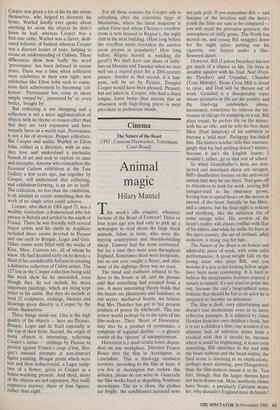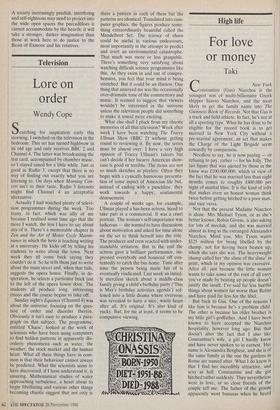Cinema
The Nature of the Beast (PG', Cannons Haymarket, Tottenham Court Road)
Animal magic
Hilary Mantel
This week's idle enquiry: whatever became of the Beast of Exmoor? Three or four years ago you had only to pick up a newspaper to read about the large black animals, feline in form, who were dis- maying countrymen and disembowelling sheep. Exmoor had the most celebrated, but for a time they were seen throughout England. Sometimes there were footprints, but no one ever caught a Beast, and after most of the sightings there was no trace.
The timid and stubborn refused to be- lieve in the beasts at all, and the prosaic said that something had escaped from a zoo. A more interesting theory holds that the beasts are phantasms and familiars; in our secret, mediaeval hearts, we believe that Mrs Thatcher has got to her present position of power by witchcraft. This last notion would perhaps be to the taste of the film-makers. Their 'Beast of Haverston' may also be a product of economics, a symptom of regional decline — a ghostly cousin of the 'spectre' of unemployment.
Haverston is a small textile town, depen- dent on one workplace. Director Franco Rosso shot the film in Accrington, in Lancashire. This is fried-egg sandwich territory, according to the film at least; if you live in Accrington but eschew this delicacy, please do not write in. Generally the film works hard at dispelling Northern stereotypes. The air is clean, the clothes are bright, the sandblasted terraced rows
are pale gold. If you remember Kes — and because of the location and the hero's youth the films are sure to be compared you will recall the pervasive greyness, the atmosphere of chilly grime. The North has moved on, and young Bill snuggles down for the night (after putting out his cigarette, one hopes) under a lilac- flowered duvet.
However, Bill (Lynton Dearden) has not got much of a chance in life. He lives in amiable squalor with his Dad, Ned (Fred- die Fletcher) and Grandad, Chunder (Tony Melody). Stone Cross Mill is about to close, and Dad will be thrown out of work. Grandad is a disreputable toper whose pleasures in life are his poultry and the fried-egg sandwiches above- mentioned; sometimes he relieves the bit- terness of old age by stamping on a rat. Bill plays truant; he prefers life on the moors, with his air rifle, and he tells his best mate Mick (Paul Simpson) of his ambition to become a 'wild man'. Pedagogy has failed him. His history teacher tells him encoura- gingly that his bad spelling doesn't matter, because it isn't the English lesson; I wouldn't, either, go to that sort of school.
So when Grandfather's hens are mas- sacred and moorland sheep are savaged, Bill's disaffection focuses on the anti-social animal that may be out there. Dad goes off to Aberdeen to look for work, leaving Bill unsupervised as his obsession grows, freeing him to spend hours on the moors in pursuit of the beast. Initially he has Mick, and a camera; but his final night is solitary and terrifying, like the initiation rite of some savage tribe. His version of the beast's reality will always conflict with that of his elders; and while he stalks his fears in the open country, the net of civilised, adult authority is being cast for him.
The Nature of the Beast is an honest and admirable piece of work, with some solid performances. A great weight falls on the young actor who plays Bill, and you wonder if a less stolid-looking fellow might have been more convincing. It is hard to believe his inexpressive features conceal a nature in tumult; it's not cruel to point this out, because the cast's biographical notes indicate that should he fail as an actor he is prepared to become an astronaut.
The film is droll, very entertaining and doesn't lose momentum even in its more reflective passages. It is adapted by Janni Howker from her own children's book, but it is not a children's film; one wonders if its ultimate lack of ambition stems from a residual wish that it should be, because where it could be frightening, it is not even unsettling. Bill identifies in the end with the beast without and the beast within; the final scene is alarming in its implications, perhaps more alarming, post-Hungerford, than the film-makers meant it to be. You feel, though, that the larger themes have not been drawn out. More northerly climes have Nessie, a peculiarly Calvinist mons- ter; why shouldn't England have its beasts? A society increasingly prudish, interfering and self-righteous may need to project into the wide open spaces the peccadilloes it cannot accommodate by the hearth; it will take a stronger, darker imagination than those at work here to do justice to the Beast of Exmoor and his relatives.











































































 Previous page
Previous page